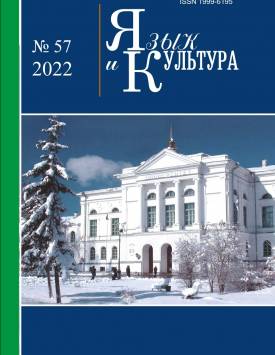Representation of linguistic and psycholinguistic security in language consciousness
The article presents the results of a comparative study of the verbal representation of the terms “linguistic security” and “psycholinguistic security” in order to specify their content interpretation. This work is relevant because of the demand for the development of ideas about the language personality, experiencing significant traumatic loads under the influence of the expansion of information uncertainty and aggressive manipulative pressure of the environment on a person. Overcoming the remaining incompleteness and inconsistency of the stated terminological interpretation in this study is implemented by means of empirical research. Its purpose was to study the concepts of “linguistic security” and “psycholinguistic security” in the minds of subjects specializing in the language field. The research hypothesis is the assumption that there are semantic features of the concepts “linguistic security” and “psycholinguistic security” in the minds of subjects of language specialization, due to the generality of the generic concept “security” and the uniqueness of the scope of each of them. The study was carried out on 100 undergraduate and graduate students studying a foreign language on a professional basis in a number of Russian universities (Moscow state linguistic university, Russian international academy of tourism, Stavropol state pedagogical Institute). The research was exploratory in nature and was based on the use of free association experiment as the main method of data collection. The study found that the complexity of the concept construction (“security” - “linguistic security” - “psycholinguistic security”) is accompanied by a decrease in the volume of subject reactions produced by it. The most complete reconstruction of the structure of the semantic field of a stimulus is possible to obtain its first reactions. Concretization of the subject of the basic concept of “security” leads to a shift in its associations to this subject, significantly changing the psycholinguistic universals of its understanding, which reveals a significant variability in the representation of security in the subjective picture of the world. The results of the study confirmed that the terms “security”, “linguistic security” and “psycholinguistic security” are characterized by a different volume of associative fields. The concepts of “linguistic security” and “psycholinguistic security” have a semantic similarity with the concept of “security”, confirmed by the presence of the element protection in their associative fields, and differences as a consequence of the features of their subject specialization. The concept of “linguistic security” is mostly applied to the characterization of the security of a native speaker of language consciousness as a subject of social interaction, and the concept of “psycholinguistic security” - as a subject of various language processes that have external expression and internal reflection. Based on the made conclusions, linguistic security is understood as the security of the subject of social interaction, the reproducibility of which is ensured by the regulation of its language systems by traditions, culture and language norms; psycholinguistic security is the security of the language personality, the security of whose language systems is supported by mental means. The conclusions made in the study can become the basis for further research on the problems of language personality. Orientation in the nuances of linguistic and psycholinguistic security can be one of the criteria for the professionalism of future linguists, a significant prerequisite for their ability to ensure the mental health and well-being of their own and this one of the subjects of their communication.
Keywords
security, linguistic security, psycholinguistic security, stimulus, reaction, association, associative field, concept, language consciousness, language personalityAuthors
| Name | Organization | |
| Krasnyanskaya Tatyana M. | Moscow State University for the Humanities | ktm8@yandex.ru |
| Tylets Valery G. | Moscow State Linguistic University | tyletsvalery@yandex.ru |
| Iokhvidov Vladimir V. | Stavropol State Pedagogical Institute | vlnauka@mail.ru |
References

Representation of linguistic and psycholinguistic security in language consciousness | Yazyk i Kultura – Language and Culture. 2022. № 57. DOI: 10.17223/19996195/57/3
